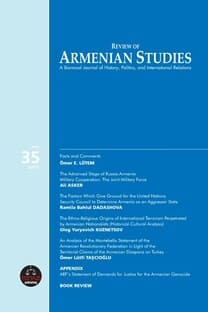(Dağlık karabag ihtilafı: Geciktirilmiş bir çatışma)
(Dağlık karabag ihtilafı: Geciktirilmiş bir çatışma)
The aim of this paper is to discuss the historical background of the Nagorno-Karabakh conflict, to identify the positions of the main parties involved and to analyze this dispute from two different level-of-analyses. The first analysis will be a systemic one where the system level conflict dimension in the Caucasus will be investigated. This analysis will demonstrate how the two aspiring hegemons', namely the United States (US) and Russia, rivalry over critical energy resources in the Caucasus let the Nagorno-Karabakh conflict unresolved. The reasoning behind this hypothesis is that since other actors in the region have quite limited power capabilities vis-â-vis these great powers, the systemic dimension of the conflict counteracts their involvement to the definitive resolution. On the other hand, the second analysis which will examine the domestic factors determining foreign policy choices of the actors involved in the conflict will provide an alternative preference formation process other than the structural one. This approach will present the impact of state-society relations on the conflicted actors' preferences and foreign policy choices. Making this kind of a dual study is a necessity in terms of seeing the complete picture and understanding the reasons of why the Nagorno-Karabakh conflict remains unresolved despite all the bilateral and international efforts.
___
- Abasov, A. and Khachatrian, H. Karabakh Conflict Variants of Settlement: concepts and reality. 3rd edition. Baku/Yerevan: Areat, Noyan Tapan. (2006)
- Attar, Aygün. Karabağ Sorunu Kapsamında Ermeniler ve Ermeni Siyaseti (Ankara: Atatürk Research Center Publications, 2005)
- "Azerbaijani parliament approves Military Doctrine" News.Az Website (09.06.2010).
- "Azerbaijan to discuss Russian-Armenian military agreement at OSCE PA's session" Trend News Website (30.08.2010).
- Cameron, Fraser. US Foreign Policy after the Cold War: Global Hegemon or Reluctant Sheriff? (London: Routledge, 2002)
- Cabbarlı, Hatem. "Ermenistan ve Rusya Arasında Gelişen İşbirliği" Azsam (April 2006)
- Cornell, Svante E. "Turkey and the Conflict in Nagorno-Karabakh: A delicate Balance" Middle Eastern Studies 34, no. 1 (1998) pp. 51-72.
- Cutler, R M. "Azerbaijan and Turkey clash over energy" Asia Times Online, (23.10.2009).
- Dietzen, Mark. 2010-11 Fox Fellow to Freie University in Berlin, A New Look at Old Principles: Making the Madrid Document Work. Caucasus Edition : April 1, 2011, Volume 4, Issue 1.
- "Erdoğan Wants Armenian Withdrawal from Karabakh" Euronews Website (11.10.2009).
- Haroutiun Khachatrian, "The Nagorno-Karabakh Conflict: Perspective of a Year-Long Deadlock" Caucaz Europe News (07.10.2007)
- Goshgarian, Rachel "Breaking the Stalemate: Turkish-Armenian Relations in the $21^{st}$ Century" Turkish Policy Quarterly. (Winter 2005) Vol.4 No.4. pp. 51-62
- Johnson, Lena. "The New Geopolitical Situation in the Caspian Region". The Security of the Caspian Sea Region, ed. Gennady Chufrin. (New York: Oxford University Press, 2001)
- Kurkchiyan, Marina. "The Karabakh Conflict". The Armenians: Past and Present in the Making of National Identity, ed. Edmund Herzig and Marina Kurkchiyan. (New York: RoutledgeCurzon, 2005)
- Libaridian, Gerard. The Challenge of Statehood, (Cambridge: Blue Crane Books, 1999)
- Malysheva, Dina. "The Conflict in Nagorno-Karabakh: Its Impact on Security in the Caspian Region". The Security of the Caspian Sea Region, ed. Gennady Chufrin. (New York: Oxford University Press, 2001)
- Maharramzadeh, Akif. "Armenian-Azerbaijan Relations and the Nagorno-Karabakh Conflict in the Foreign Policy of Turkey." The Journal of Turkish Weekly Website {14.12.2006)
- Mearsheimer, John J. The Tragedy of Great Power Politics. (New York: Norton, 2003)
- Minasyan, Sergey "Nagorno-Karabakh after Two Decades of Conflict : is Prolongation of the Status Quo Inevitable?" Caucasus Institute Research Papers ; JVb 2, Yerevan : Caucasus Institute, 2010.
- Moravcsik, Andrew. "Taking Preferences Seriously: A Liberal Theory of International Relations" International Organization, Vol. 51, No. 4. (1997), pp. 513-553
- Niftiyev, Efgan. "Why did Russia support Turkish-Armenian Rapprochement?" Washington Review of Turkish and Eurasian Affairs, June 2010.
- Ogan, Sinan. "Presidential Elections in Russia and Armenia and their Impact on Turkey and the Region" 2023 (15.03.2008)
- Özertem, Hasan Selim, "Russia's Strengthening Military Presence in the Caucasus and the Black Sea" The Journal of Turkish Weekly, August 2010.
- "Referendum in Nagorno-Karabakh Caused a Problem" Sabah Newspaper (11.12.2006)
- Rosenkvist, Morten Anstorp. "Black Soil. Oil and Ethnicity in the Nagorno-Karabakh Conflict" Working Papers - Programa CEI & Paises Bâlticos 007, (Argentine Center of International Studies, 2005)
- "Seven Years of Conflict in Nagorno-Karabakh" Human Rights Watch Website (December 1994)
- Viotti, Paul R. and Kauppi, Mark V. International Relations Theory: Realism, Pluralism, Globalism, and Beyond, 3rd Edition (Boston: Allyn and Bacon, 1998)
- Waltz, Kenneth. Theory of International Politics. (New York: McGraw Hill, 1979)
- ISSN: 1303-5304
- Yayın Aralığı: Yılda 2 Sayı
- Başlangıç: 2002
- Yayıncı: Terazi Yayıncılık Basım Dağıtım Danışmanlık Eğitim Organizasyon Matbaacılık Kırtasiye Tic. Ltd. Şti.
